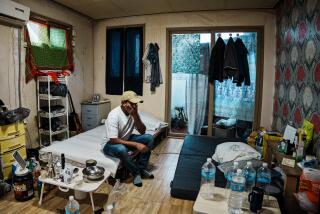James Groppi, Ex-Priest, Civil Rights Activist, Dies
James Groppi, a former Roman Catholic priest who led more than 200 demonstrations in Milwaukee on behalf of open housing nearly 20 years ago and was arrested more than a dozen times in his quest for civil rights for all Americans, died Monday in that city at the age of 54.
His wife, the former Margaret Rozga who marched with Groppi through much of the strident 1960s, said her husband, who was excommunicated after their marriage in 1976, died “very peacefully and comfortably at home with us.”
The father of two daughters and a son, Groppi had undergone surgery for a brain tumor last December and had since been partially paralyzed and confined to a wheelchair. He most recently had been head of the union representing county bus drivers in Milwaukee after studying at Virginia Theological Seminary for priesthood in the Episcopal Church. He was offered a job by an Episcopal bishop in Detroit but said he would not move.
Child of Ghetto
Groppi, who described himself as “a child of the Italian ghetto,” was an associate pastor at St. Boniface Roman Catholic Church on Milwaukee’s black North Side in 1965 when he journeyed to Selma, Ala., to march alongside Dr. Martin Luther King Jr. That bloody demonstration seemed to whet Groppi’s appetite for activism and he went home to organize a civil rights campaign centered on equal housing and education for his predominantly black parishioners.
Within three months he had been arrested for the first time when he and four other clergymen formed a human chain in front of a city school to protest what they said were racial imbalances.
From 1966 to 1969 Groppi, working often with the local Youth Council of the National Assn. for the Advancement of Colored People, took part in dozens of demonstrations that eventually led to passage of fair housing laws in most Wisconsin cities and after that improvements in segregated classrooms.
Famous Son
His followers, parodying a popular beer commercial of the day, referred to the then-priest as “Groppi: The Name That Made Milwaukee Famous.” For a time he probably was Milwaukee’s best-known export. He and 1,000 followers took over the Wisconsin State Assembly in Madison in a sit-down protest that again put Groppi behind bars on a contempt citation that eventually was overturned by the U.S. Supreme Court. He went east--to Yale--to show his support for a strike by that university’s employees, returned south--to march again with King’s supporters in the Southern Christian Leadership Conference--and to the West Coast--where he joined 1,500 others in a peaceful march in downtown Los Angeles in 1970 protesting the Vietnam War.
By then Groppi and his fellow white clergymen had left St. Boniface’s, turning the church over to a group of black priests. It had become a place where tutoring and Head Start programs were far more evident than traditional bingo and card parties.
The slender, bespectacled Groppi spent the early 1970s continuing to protest Vietnam and the draft and in 1975 joined actor Marlon Brando as a negotiator between police and armed Indians who had taken over an unoccupied novitiate in Gresham, Wis.
Seeks Jobless Benefits
The next year he married, was excommunicated and applied for unemployment benefits, saying that “for 26 years this has been my trade. . . . I don’t have any other.”
He drove a taxi and then a bus and told an interviewer in 1981 that he initially missed his brushes with fame but had found “after a number of years you sort of learn to live with that. You’re not so touchy about loss of titles and loss of status anymore.”
In June the former priest, one of 12 children born to Italian immigrants, sat in his wheelchair at a Milwaukee dais as 600 of his friends and admirers honored him at a dinner. Groppi concluded the evening by leading the assemblage in a song--”Oh, Freedom.”
More to Read
Start your day right
Sign up for Essential California for news, features and recommendations from the L.A. Times and beyond in your inbox six days a week.
You may occasionally receive promotional content from the Los Angeles Times.






